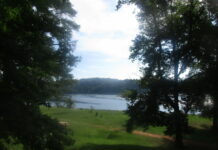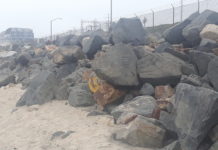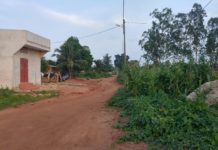Photo Credit: Global Diaspora News (www.GlobalDiasporaNews.com).
Water and Sanitation Minister Pemmy Majodina has committed to ensure that women’s emancipation remains one of the department’s key focus areas, in line with government’s constitutional responsibility to protect, promote and advance the rights of women in all areas of the economy.
Briefing media on departmental plans and priorities for 2024/25 in Boksburg on Monday, Majodina said as the country celebrates 30 years of freedom and democracy this year, the month of August serves as an opportunity for the water sector to reflect on how women, in particular, are affected by a lack of access to clean water and safe sanitation.
“Women normally bear the brunt of the burden of fetching water from afar when they do not have access to clean running water. There is an ongoing need to ensure that women are equitably represented in the sector and have access to opportunities that are available in the sector,” Majodina said.
Community outreach programmes
Majodina said the department will be undertaking community outreach programmes to educate communities to understand that the provision of water services falls under the municipalities’ roles and responsibilities.
This follows numerous calls and messages received by the department, where the public, including local provincial leaders, share their challenges with water and sanitation service delivery at local level.
Among the challenges reported include lack of access to water, sewage pollution, and disruptions in water supply for various reasons.
According to the Minister, the callers do not seem to understand that the provision of water services is the responsibility of municipalities, not the national Department of Water and Sanitation.
“It will be a priority for us to correct this misunderstanding and to encourage communities and community leaders to hold their municipalities accountable for the delivery of water and sanitation services.
“When we receive calls related to the responsibilities of the national department or the water boards, we ensure that these issues are dealt with.
“The first point of call for residents to raise issues regarding municipal water and sanitation services must be their municipalities. However, when we receive calls related to water and sanitation services which are the responsibility of municipalities, we refer these to the relevant municipalities to resolve,” Majodina said.
Majodina reiterated that only the municipalities can resolve these issues, and “the national department cannot do maintenance or repairs to municipal infrastructure on behalf of a municipality”.
The call centre number where the department receives complaints and queries about all aspects of water and sanitation in the country is 0800 200 200.
Highlighting the department’s activities during its first 30 days, Majodina said the department has presented the Budget Vote Policy Statement for the 2024/2025 financial year to Parliament, followed by a series of appearances before various parliamentary committees.
READ I Majodina commits to improving water, sanitation services
“In addition, we have also met and had robust engagements with our seven water boards on their plans, the projects they are undertaking, and the challenges they face in their effort to provide potable bulk water services to their customers, who are municipalities and industries within their areas of service,” Majodina said.
Increase in water demand
While South Africa is one of the 30 most water-scarce countries in the world, Majodina said the consumption of water is 218 litres per capita per day, compared to the international average of 173 litres per capita per day.
“We have already captured 75% of the available surface water in dams, and the remaining opportunities for capturing surface water are expensive. At the same time, the demand for water in South Africa is increasing, as a result of population growth and economic growth.
“The average national access to at least an RDP level of water service has increased from approximately 60% in 1994 to approximately 90% currently. This is a major achievement,” Majodina said.
RDP or higher service levels are regarded as tapped (safe) water through a communal stand pipe within 200 metres from the dwelling, water in the yard or water in the dwelling. – SAnews.gov.za
Source of original article: SAnews – South African News (www.sanews.gov.za).
The content of this article does not necessarily reflect the views or opinion of Global Diaspora News (www.GlobalDiasporaNews.com).
To submit your press release: (https://www.GlobalDiasporaNews.com/pr).
To advertise on Global Diaspora News: (www.GlobalDiasporaNews.com/ads).
Sign up to Global Diaspora News newsletter (https://www.GlobalDiasporaNews.com/newsletter/) to start receiving updates and opportunities directly in your email inbox for free.




























